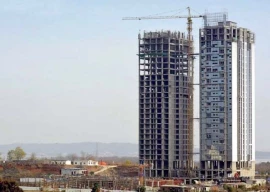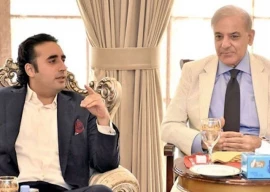
Arguing that India has largely exercised military restraint over its 65 years existence, political scientist and Fellow at the Brookings Institute Dr Sunil Dasgupta delivered a talk at the Forman Christian College on Friday in his first visit to Pakistan.
The talk India’s Military Modernisation and its Strategic Implications, was organised by the Griswold History Society. It revolved around the idea that India, despite its size and military capability, has been unwilling to use force.
Dr Dasgupta says he has dealt with this in the book, Arming without Aiming: India’s Military Modernisation, co-authored with Stephen Cohen. Dr Dasgupta said the book, by and large, received negative feedback in India.
“Over the last 65 years India has had a problem with Pakistan but India has been reluctant to use force and has shown military restraint,” Dr Dasgupta said. He said the increase in Indian defence spending was concurrent with the country’s economic growth and not due to any outside threat, except instances like the 1962 war with China.
Speaking about the 1971 war with Pakistan, Dr Dasgupta said while India won on the eastern front, it exercised restraint by not attacking the western front despite an active dispute between Pakistan and India. He said there was a lack of political guidance to the military regarding what they should do. “There is a disconnect between the Indian political leadership and the military,” he said.
He said while the Indian political leadership is confident it has the final say on the use of force, the military exercises the right to decide how to prepare to use force – the two are considered separate. “Militaries are modernising but they have no clear definition of purpose,” he said.

“China does not take India’s military power seriously”, Dr Dasgupta said. He said China’s only concern was cooperation between India and the US. He said while China receives global condemnation regarding its military escalation, similar escalation by India is accommodated and even encouraged. “Largely speaking India gets away with what it wants,”
Speaking about Siachen during the question and answer session, Dr Dasgupta said the Indian cost was larger than the one incurred by Pakistan. He said policies are evolving on both sides which are recognising the losses. “From my perspective, the fact that a large country could not resolve its issues with a county one-fifth its size over 60 years suggests a puzzle or a dichotomy,” he said.
Asked about Kashmir, Dr Dasgupta said the two countries appeared to not want to resolve the dispute. “We can only hope the political leadership on both sides show maturity - but we also know how [un]likely that is,” he said.
Asked about the 2004 Musharraf-Vajpayee talks to resolve the Kashmir dispute, Dr Dasgupta agreed that had the issue been resolved, it would have been a great achievement for the two countries.
He said that when Musharraf’s resignation in 2008 was followed by the Mumbai attacks, the situation between India and Pakistan grew tense and suspended all attempts to negotiate.
“The political instability in Pakistan has been a chronic deterrent for effective negotiations,” he stated.
“A stable legitimate regime in Pakistan would provide it a better chance to negotiate not just with India but also the rest of the world,” Dr Dasgupta said.
Published in The Express Tribune, December 15th, 2012.


















1713904359-0/burn-(1)1713904359-0-270x192.webp)


















COMMENTS
Comments are moderated and generally will be posted if they are on-topic and not abusive.
For more information, please see our Comments FAQ